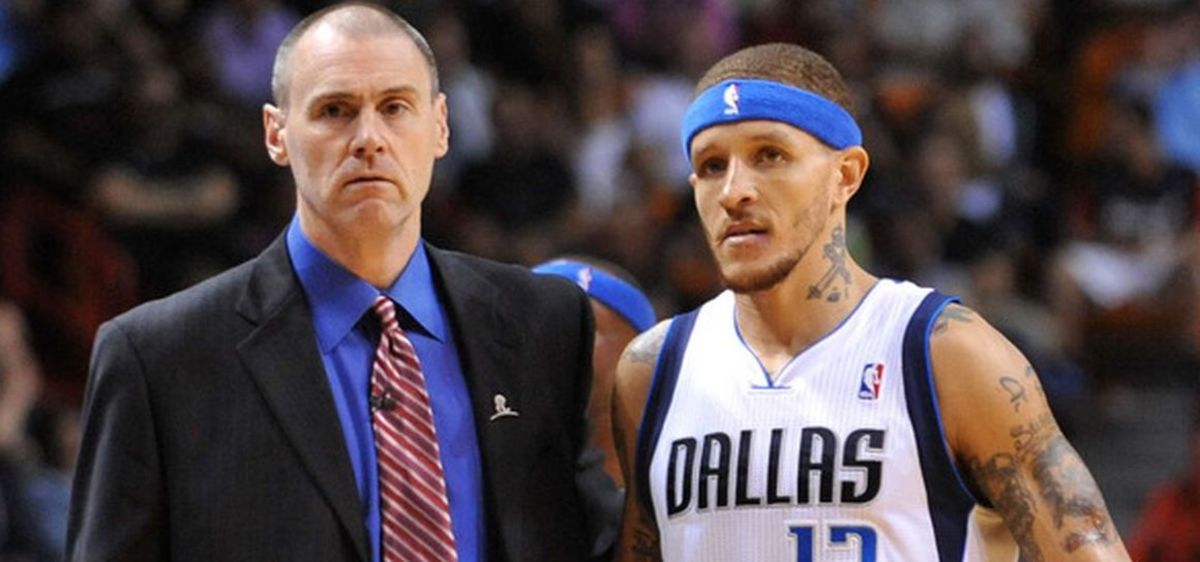From Dak to Delonte: Updating NFL's Cowboys, NBA's Mavs Challenges
A recent in-depth profile of Dallas Cowboys pass-rusher Randy Gregory attempts to paint the darkest possible picture. It reads: "The worst fear was Gregory would end up like former NBA player Delonte West: homeless and lost, sharing a secluded area of a downtown street with things with long tails and pointy faces.''
Delonte West, even two years after hitting the headlines and now, having spend all this ensuing time in rehab and working his way back, in part under the guidance of Dallas Mavericks owner Mark Cuban, remains the "poster guy'' for how mental illness can ruin an athlete.
***
It was Autumn 2012, and Delonte West was readying for a second season with the Dallas Mavericks - a franchise a year removed from an NBA title trying to do the same. I approached West with some apprehension as we arranged an on-camera interview, and somehow, the subject of his "split personalities'' and "multiple personalities'' was broached.
"You can ask me about all my personalities,'' Delonte gleefully told me, bobbing somewhere between"delightful'' and "disturbing.'' "I don't deny them. I'm proud of them. They're all me.''
In recent years, via the cameras-are-everywhere social-media phenomenon, the public has witnessed "all'' of West. There are the videos of this man who earned $16 million in the NBA appearing to be a beggar, videos of him appearing to be homeless, filthy and lost, and now a horrifying video of him being beaten brutally, relentlessly, in the middle of a freeway near his native Washington, D.C. by another man with mercilessly heavy fists and boots.
(The Prince George County Police Department says West and the other man in the video (caution: It is highly-disturbing) know each other, are refusing to cooperate with detectives, and that outrageously, the video of West may have been taken by a police officer.)
Then came new gone-viral photo of West, roaming the streets of Dallas while carrying a sign asking for money.
None of this is the result of his NBA family failing to attempt to help him. But in the years since this incident, there has, happily, been more help, more understanding, in ways that extend well beyond Delonte's struggle.
The Mavs organization tried, on multiple occasions over the course of a few seasons, to harness West's unique talents while also trying to offer off-the-court guidance to those "personalities.'' In 2011-12, the year after the title, he averaged 9.6 points per game. The team was in limbo, but he wasn't; West, who'd been dumped the year before by the Celtics in part due to a frightening weapons charge (an armory of loaded guns packed aboard West's three-wheeled Can-Am Spyder motorcycle), was emerging from limbo, if just a little bit.
Dallas re-signed him in 2012, and he played in all seven preseason games, averaging 5.0 points, 2.0 assists and 1.3 rebounds in 17.6 minutes per game. This wasn't going to be like Cleveland, where in 2008-09 he played on a three-year $12.7 million contract with the Cavaliers to serve as a LeBron James helper and started on a team that won 66 games and advanced to the East Finals.
But he had a job (no small thing for an NBA player who ran out of dough during the 2011 NBA lockout and found himself applying for a job at Home Depot). And the support of owner Mark Cuban, who I know personally matched West with a financial advisor. And the support of coach Rick Carlisle, who offered the perfect combination of hard-ass/soft-hug guidance I thought might truly "save'' Delonte.
But as the regular season was about to begin, Delonte earned a suspension. He was reinstated a day later, then playfully referred to his coach as “Uncle Ricky’’ and compared his brief suspension to a dispute at a “family barbecue.’’
"Delightful'' and "disturbing.''
Carlisle responded at the time by noting, rather warmly, that West is player with a personality so “different’’ that while most NBA players “run on gas, Delonte runs on diesel.’’
It was meant as a compliment, something Rick would want Delonte to hear and to absorb. Maybe, by celebrating his uniqueness, the NBA player, who as a teenage star often cut himself, guzzled pills and attempted suicide, could be reached. Maybe the NBA player, by that time nearing 30, who acknowledged his bipolar disorder - but then later announced that he really didn't need the medication doctors had prescribed for it - needed to be reached.
“I’ve got to help him,” Carlisle said that week, “and our organization is going to help him, too.’’
Twice after that, the Mavs organization did indeed try, by inviting Delonte to play for their G-League affiliate in Frisco, the Texas Legends. In serving as the Legends TV color analyst, I delighted in his relative success in 2013, which he used as a springboard to play in China. But he left unpleased, thinking the G-League stint was designed to springboard him back to the Mavs, when in fact, the organization was simply trying to help him get on his feet.
West was out of basketball again by 2015. Again, the Legends reached out. He showed up, and stayed for a few weeks, but hurt his hand and at age 32, was never to play again.
After Delonte's second Mavs suspension in 2012, he basically locked himself up in his pricy apartment next door to the American Airlines Center. He looked out the high-rise window one day and, noticing the Mavs fans shuffling into the AAC, tweeted, “I’m just sittin' here across from the arena wit tear in my eyes.”
The tears apparently haven't gone away. Nor have some of the stories, including the urban-legend tale of West sleeping with LeBron's mother. But the past doesn't matter much now, not compared to a Delonte future that seems to be hanging by a shoestring.
Carlisle addressed the latest news at the AAC before the Clippers-at-Mavs tipoff, saying that he's aware of the latest video. 'I've heard it's a very sad situation,'' Carlisle said. "You never want to see any human being go through something like that.''
You sense that the Mavs would once again like to help. You know that West's guys from back at Saint Joseph, coach Phil Martelli and teammate Jameer Nelson) would, too.

Back during his double-suspension, Carlisle fended away prodding reporters by citing a Sara Bareilles song called, "King of Anything.''
It’s a song,'' Rick told us, "about people who should mind their own business.''
***
Things have changed. Carlisle is no longer the coach of the Mavs, replaced by Jason Kidd, who, when I asked him about his domestic violence past, said, "You can't run from it ... You have to talk about it.''
Kidd also mentioned prominently the help and the work of Dr. Don Kalkstein, a Mavs staffer and a preeminent psychologist.
Carlisle was trying to help. But really, we shouldn't mind our own business. NFL stars like Dak Prescott and Aaron Rodgers are saying so, and fellow star Richard Sherman is showing why. So is former standout Marion Barber, who former teammate Dez Bryant confirms is "down-and-out.''
***
Tucked into the lyrics of "King of Anything'':
I hate to break it to you babe, but I'm not drowning
There's no one here to save
In truth, sports and beyond, there are a lot of Delonte Wests to save.
